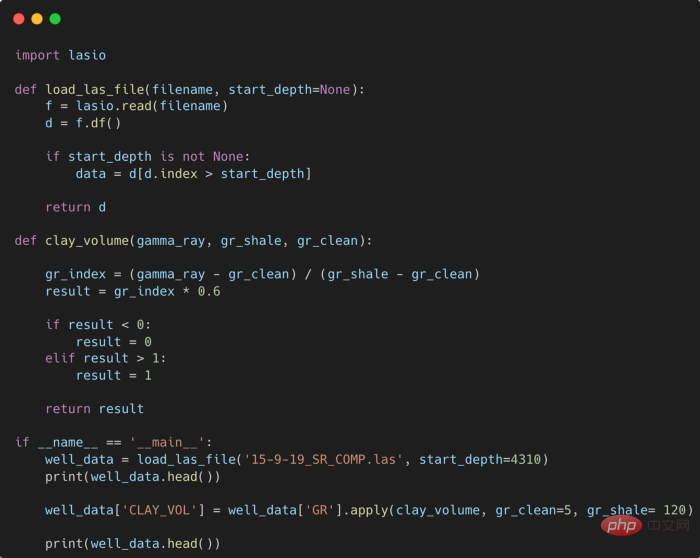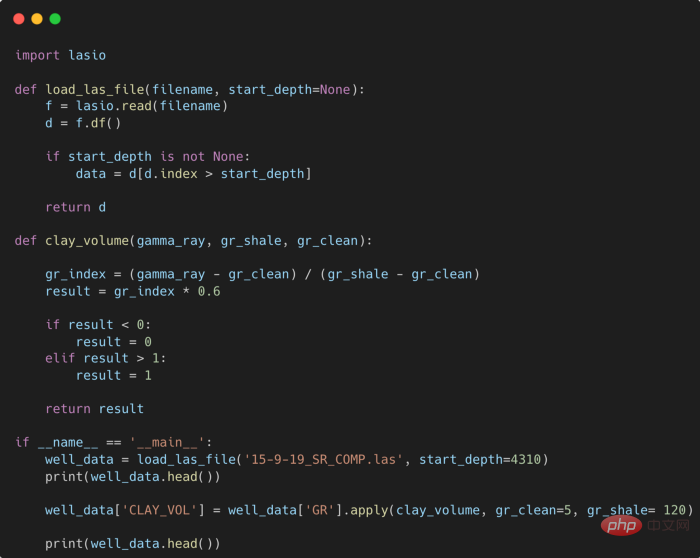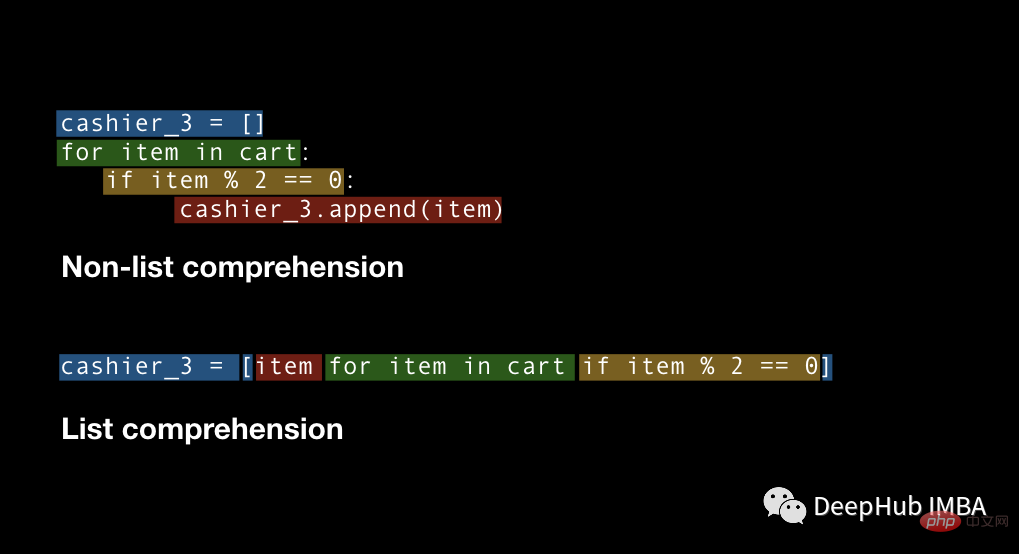 Backend Development
Backend Development PHP Tutorial
PHP Tutorial Top Ten Tips to Improve Your PHP Application Strength_PHP Tutorial
Top Ten Tips to Improve Your PHP Application Strength_PHP TutorialAgni Website Building Academy Documents On the Smashing Magazine website, Glen Stansberry proposed ten advanced PHP tips that can instantly improve your PHP programming skills, including a "cheat sheet" for SQL injection attacks ”, simplify the else part of the judgment sentence, use regular expressions, ternary operators, Memcached database caching system, etc. only when necessary. The following is the detailed content.
PHP started as a humble programming language in 1995. It has developed rapidly over the years and is now one of the most popular web development languages. Many popular websites are developed using PHP, and the vast majority of programs and websites Projects are written in this popular language.
Because PHP is so popular, it is almost impossible for any website developer not to know PHP. This tutorial is for those who have just completed the initial stage of learning PHP and roll up their sleeves and are ready to work hard. Listed below The ten excellent tips that PHP developers must learn and use every time they program. These tips can speed up your proficiency in PHP, making the code run faster, more concisely, and with better performance.
1. Using SQL Injection Attack Cheat Sheet
SQL injection attack is a very nasty thing, it is a security vulnerability that allows hackers to sneak into your database by exploiting holes in the code. Although this article has nothing to do with MySQL, many PHP programs use the MySQL database, and if you want to write secure code, it is useful to know what situations to avoid.
Furruh Mavituna wrote a very interesting SQL injection attack cheat sheet, including a chapter about the security vulnerabilities of PHP and MySQL. If you can avoid the behaviors described in it, your program will not be vulnerable to attacks. .
2. Understand the differences between various comparison operators
Comparison operators are a very important part of PHP. Unfortunately, many programmers are not familiar with the differences between them. In fact, according to an article published on the IO Reader website, many PHP developers cannot distinguish between PHP operators. The differences between comparison operators, quote a few sentences from the article:
This is extremely important, but many PHP developers simply don’t know the difference between == and ===. Essentially, == determines whether two values are equal, and PHP will try to convert the data before comparing it. The type starts with, for example: 1== '1' (true); === determines the value and data type at the same time, for example: 1==='1' (false). Developers must understand the impact of these operators on commonly used functions as soon as possible. The practicality of formulas such as strpos(), because PHP treats zero as "false", without === we have no way of knowing whether a searched string is at the beginning of a longer string, or does not exist at all. In many cases In other applications, === is useful when returning a value of zero does not necessarily equal false.
You can go to the PHP.net website to see a list of various comparison operators.
3. Simplify the else part of the judgment sentence
I must remind everyone that the third and fourth points may reduce the readability of the code. These two points emphasize speed and performance. If you don’t want to sacrifice the readability of the code, you may want to skip them. .
Anything that can make the code simpler and smaller is usually a good practice. One of them is to extract the content of the else statement. Christian Montoya has a good example of using a shorter else statement to convert characters.
Common else narrative sentences:
The following is the quoted content:
{ $x = 5;<table style="BORDER-RIGHT: #cccccc 1px dotted; TABLE-LAYOUT: fixed; BORDER-TOP: #cccccc 1px dotted; BORDER-LEFT: #cccccc 1px dotted; BORDER-BOTTOM: #cccccc 1px dotted" cellspacing="0" cellpadding="6" width="95%" align="center" border="0"><tbody><tr><td style="WORD-WRAP: break-word" bgcolor="#fdfddf"><font color="#ff0000">以下为引用的内容:</font><br /><pre class="brush:php;toolbar:false">$x = 10;<br />if( this condition )<br />{<br />$x = 5;<br />} } <span><span class="google-src-text" style="DIRECTION: ltr; TEXT-ALIGN: left">if( this condition )</span>如果(这种情况)</span> <span><span class="google-src-text" style="DIRECTION: ltr; TEXT-ALIGN: left">{</span> (</span> <span><span class="google-src-text" style="DIRECTION: ltr; TEXT-ALIGN: left">$x = 5;</span> $ x = 5 ;</span> <span><span class="google-src-text" style="DIRECTION: ltr; TEXT-ALIGN: left">}</span> )</span> <span><span class="google-src-text" style="DIRECTION: ltr; TEXT-ALIGN: left">else</span>其他的</span> <span><span class="google-src-text" style="DIRECTION: ltr; TEXT-ALIGN: left">{</span> (</span> <span><span class="google-src-text" style="DIRECTION: ltr; TEXT-ALIGN: left">$x = 10;</span> $ x = 10 ;</span> <span><span class="google-src-text" style="DIRECTION: ltr; TEXT-ALIGN: left">}</span> )</span>else | {
If the default value of $x is 10, we start from 10 without specifying its value in the else part.
|
以下为引用的内容: if ($gollum == 'halfling') { $height --; } |
The following is the quoted content: if ($gollum == 'halfling' ) {$height --;}
这是相同的:<br>
这个方法可以在程式中多次使用:<br><br>
5. 取 str_replace(),捨 ereg_replace() 及 preg_replace() 以效率来说,str_replace() 比正规表达式更适合用来取代字符串,据一些研究,str_replace() 的效率比 ereg_replace() 和 preg_replace() 高 61%。 <span><span class="google-src-text" style="DIRECTION: ltr; TEXT-ALIGN: left">$x = 10;</span> $ x = 10 ;</span> <span><span class="google-src-text" style="DIRECTION: ltr; TEXT-ALIGN: left">if( this condition )</span>如果(这种情况)</span> <span><span class="google-src-text" style="DIRECTION: ltr; TEXT-ALIGN: left">{</span> (</span> <span><span class="google-src-text" style="DIRECTION: ltr; TEXT-ALIGN: left">$x = 5;</span> $ x = 5 ;</span> <span><span class="google-src-text" style="DIRECTION: ltr; TEXT-ALIGN: left">}</span> )</span>
|
 提高 Python 代码可读性的五个基本技巧Apr 12, 2023 pm 08:58 PM
提高 Python 代码可读性的五个基本技巧Apr 12, 2023 pm 08:58 PMPython 中有许多方法可以帮助我们理解代码的内部工作原理,良好的编程习惯,可以使我们的工作事半功倍!例如,我们最终可能会得到看起来很像下图中的代码。虽然不是最糟糕的,但是,我们需要扩展一些事情,例如:load_las_file 函数中的 f 和 d 代表什么?为什么我们要在 clay 函数中检查结果?这些函数需要什么类型?Floats? DataFrames?在本文中,我们将着重讨论如何通过文档、提示输入和正确的变量名称来提高应用程序/脚本的可读性的五个基本技巧。1. Comments我们可
 使用PHP开发直播功能的十个技巧May 21, 2023 pm 11:40 PM
使用PHP开发直播功能的十个技巧May 21, 2023 pm 11:40 PM随着直播业务的火爆,越来越多的网站和应用开始加入直播这项功能。PHP作为一种流行的服务器端语言,也可以用来开发高效的直播功能。当然,要实现一个稳定、高效的直播功能需要考虑很多问题。下面列出了使用PHP开发直播功能的十个技巧,帮助你更好地实现直播。选择合适的流媒体服务器PHP开发直播功能,首先需要考虑的就是流媒体服务器的选择。有很多流媒体服务器可以选择,比如常
 PHP中的多表关联查询技巧May 24, 2023 am 10:01 AM
PHP中的多表关联查询技巧May 24, 2023 am 10:01 AMPHP中的多表关联查询技巧关联查询是数据库查询的重要部分,特别是当你需要展示多个相关数据库表内的数据时。在PHP应用程序中,在使用MySQL等数据库时,多表关联查询经常会用到。多表关联的含义是,将一个表中的数据与另一个或多个表中的数据进行比较,在结果中将那些满足要求的行连接起来。在进行多表关联查询时,需要考虑表之间的关系,并使用合适的关联方法。下面介绍几种多
 提高Python代码可读性的五个基本技巧Apr 11, 2023 pm 09:07 PM
提高Python代码可读性的五个基本技巧Apr 11, 2023 pm 09:07 PM译者 | 赵青窕审校 | 孙淑娟你是否经常回头看看6个月前写的代码,想知道这段代码底是怎么回事?或者从别人手上接手项目,并且不知道从哪里开始?这样的情况对开发者来说是比较常见的。Python中有许多方法可以帮助我们理解代码的内部工作方式,因此当您从头来看代码或者写代码时,应该会更容易地从停止的地方继续下去。在此我给大家举个例子,我们可能会得到如下图所示的代码。这还不是最糟糕的,但有一些事情需要我们去确认,例如:在load_las_file函数中f和d代表什么?为什么我们要在clay函数中检查结果
 Python中简单易用的并行加速技巧Apr 12, 2023 pm 02:25 PM
Python中简单易用的并行加速技巧Apr 12, 2023 pm 02:25 PM1.简介我们在日常使用Python进行各种数据计算处理任务时,若想要获得明显的计算加速效果,最简单明了的方式就是想办法将默认运行在单个进程上的任务,扩展到使用多进程或多线程的方式执行。而对于我们这些从事数据分析工作的人员而言,以最简单的方式实现等价的加速运算的效果尤为重要,从而避免将时间过多花费在编写程序上。而今天的文章费老师我就来带大家学习如何利用joblib这个非常简单易用的库中的相关功能,来快速实现并行计算加速效果。2.使用joblib进行并行计算作为一个被广泛使用的第三方Python库(
 国内最好用的货币交易平台推荐2025Feb 27, 2025 pm 05:51 PM
国内最好用的货币交易平台推荐2025Feb 27, 2025 pm 05:51 PM国内最佳货币交易平台为: 币安:广泛的代币选择、低交易费、尖端引擎; OKX:领先的衍生品交易所,高流动性、杠杆交易; Gate.io:超过 1,400 个交易对,低费率; Bitget:创新平台,Copy Trade 功能、定制策略。
 四种Python推导式开发技巧,让你的代码更高效Apr 22, 2023 am 09:40 AM
四种Python推导式开发技巧,让你的代码更高效Apr 22, 2023 am 09:40 AM对于数据科学,Python通常被广泛地用于进行数据的处理和转换,它提供了强大的数据结构处理的函数,使数据处理更加灵活,这里说的“灵活性”是什么意思?这意味着在Python中总是有多种方法来实现相同的结果,我们总是有不同的方法并且需要从中选择易于使用、省时并能更好控制的方法。要掌握所有的这些方法是不可能的。所以这里列出了在处理任何类型的数据时应该知道的4个Python技巧。列表推导式ListComprehension是创建列表的一种优雅且最符合python语言的方法。与for循环和if语句相比,列
 十大比特币交易所排名 中国十大公认比特币交易所Jan 26, 2024 pm 07:00 PM
十大比特币交易所排名 中国十大公认比特币交易所Jan 26, 2024 pm 07:00 PM中国十大公认的比特币交易所有:欧易、MEXC、KuCoin、AAX、HitBTC、Bybit、Coinone、CoinMark、WEEX、顶峰AscendEX,中国十大公认比特币交易所1、欧易欧易交易所(点击注册)是一家专业的数字货币交易平台,支持比特币、莱特币、以太币等多种币种的在线交易。我们提供即时的行业资讯和专业分析师的指导意见,帮助用户抓住投资机会。2、MEXCMEXC致力于为用户提供一站式数字资产交易服务,包括现货、杠杆、ETF、合约等多种交易方式。为了确保用户资产安全,MEXC组建了


Hot AI Tools

Undresser.AI Undress
AI-powered app for creating realistic nude photos

AI Clothes Remover
Online AI tool for removing clothes from photos.

Undress AI Tool
Undress images for free

Clothoff.io
AI clothes remover

AI Hentai Generator
Generate AI Hentai for free.

Hot Article

Hot Tools

Safe Exam Browser
Safe Exam Browser is a secure browser environment for taking online exams securely. This software turns any computer into a secure workstation. It controls access to any utility and prevents students from using unauthorized resources.

PhpStorm Mac version
The latest (2018.2.1) professional PHP integrated development tool

MinGW - Minimalist GNU for Windows
This project is in the process of being migrated to osdn.net/projects/mingw, you can continue to follow us there. MinGW: A native Windows port of the GNU Compiler Collection (GCC), freely distributable import libraries and header files for building native Windows applications; includes extensions to the MSVC runtime to support C99 functionality. All MinGW software can run on 64-bit Windows platforms.

WebStorm Mac version
Useful JavaScript development tools

mPDF
mPDF is a PHP library that can generate PDF files from UTF-8 encoded HTML. The original author, Ian Back, wrote mPDF to output PDF files "on the fly" from his website and handle different languages. It is slower than original scripts like HTML2FPDF and produces larger files when using Unicode fonts, but supports CSS styles etc. and has a lot of enhancements. Supports almost all languages, including RTL (Arabic and Hebrew) and CJK (Chinese, Japanese and Korean). Supports nested block-level elements (such as P, DIV),






